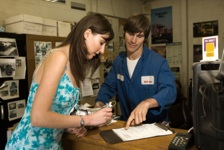 Interdisciplinary Approaches
Interdisciplinary Approaches
Inquiry is an approach that can be applied in every content area.
Over the past twenty years, the role of the media specialist has changed dramatically. Library programs have moved from teaching isolated "library skills" to an integrated approach focusing on meaningful, information inquiry projects that connect to standards across the curriculum.
Media specialists have the opportunity to bring teachers and content areas together through the development of interdisciplinary approaches to learning. For example, connect your industrial technology teacher and mathematics teacher for a practical exploration of engineering and technology.
![]() Explore the Interdisciplinary Learning in Your Classroom free, online workshop from Disney Learning Partnership.
Explore the Interdisciplinary Learning in Your Classroom free, online workshop from Disney Learning Partnership.
In the chapter Empowered Learning in Curriculum Connections through the Library edited by Stripling and Hughes-Hassell, Violet H. Harada explores thinking across the curriculum and envisions what these information skills look like in various disciplines (2003, p. 45-46):
"In language arts - literacy appreciation and analysis require strategic use of language, including being able to predict, validate, and synthesize. They also encourage analysis from multiple points of view and perspectives and the ability to identify bias and stereotyping. Students are immersed in both literary and nonliterary modes of information. Active engagement is critical.
In social studies - historical analysis involves formulating questions, obtaining data from sources, testing these sources for their accuracy and authority, and detecting and evaluating propaganda and distortion. Students develop comparative and causal analyses and construct sound historical arguments. They use resources ranging from primary documents and artifacts to virtual field studies found on the Internet.
In mathematics - problem solving in mathematics challenges students to formulate problems, consider alternative strategies to solve them, and apply a strategy and verify the results. To accomplish these aspects of problem solving, they must be able to collect, organize, and describe data; construct, read, and interpret displays of data; and formulate and solve problems that involve data collection and analysis. Mathematical inquiry provokes students to make sense of ideas in relation to one another and to the everyday world. The focus is on conceptual understanding, multiple representations, and connections.
In science - scientific inquiry necessitates that students understand key questions and concepts that guide scientific investigations. They must be able to develop testable hypotheses, design and conduct the investigations, formulate and revise explanations and models using logic and evidence, and communicate and defend their findings. Students use a wide range of tools and make choices among alternatives. Carefully planned experiments can proceed in a predictable fashion or yield startling data that lead to new questions and investigations. The process is not random; it follows a purposeful sequence of testing, data collection and analysis, and drawing of conclusions.
In information inquiry - information searching and use assume that problems and issues investigated require student engagement with information in different formats and for different purposes. Students must be able to articulate the focus of their information search, generate questions that probe the problem, consider alternative strategies to locate and retrieve data, and evaluate their value and relevance. Students also need to explore organizational schemes that help them store and use their information and to home their expertise with different communication formats."
![]() Read Thinking Across Several Content Areas (PDF) from Violet H. Harada in Empowered Learning in Curriculum Connections through the Library edited by Stripling and Hughes-Hassell.
Read Thinking Across Several Content Areas (PDF) from Violet H. Harada in Empowered Learning in Curriculum Connections through the Library edited by Stripling and Hughes-Hassell.
Violet Harada challenges school librarians to examine the curriculum from the perspective of thinking processes. She stresses the importance of self-assessment and notes that "many of us may discover that we have focused largely on tasks at the mechanical levels of performance rather than at levels requiring manipulation of information and ideas (2003, Curriculum Connections through the Library, p 48).
Harada's examples of traditional tasks:
- Using an online catalog
- Identifying the physical components of a resources
- Locating materials within a specific library
- Using an organizational scheme to take notes
- Creating a bibliography
Harada suggests that school librarians devise learning experiences that help students attack deeper aspects of an investigation.
Harada's examples of thinking strands:
- Perception and Recognition - honing question-making skills
- Storage and Retrieval - distinguishing relevant from irrelevant information
- Organization and Transformation - selecting the most appropriate information for the particular need
- Reasoning and Utilization - creating tangible evidence
- Metacognition - reflecting on how on acquires knowledge... thinking about thinking
According to Harada (2003, Curriculum Connections through the Library, p 50), "effective thinkers are disposed to explore, to question, to probe new areas, to seek clarity, and to be open to different perspectives.. students are not only problem-solvers but problem-posers. They develop a sense of ownership for the knowledge they are acquiring and are responsible for their own and others' learning. Students listen and question, visualize and connect, examine and challenge. They collaborate and support others. They are teachers as well as learners."
Learn More
Explore Key Word: Integrated Instruction.
